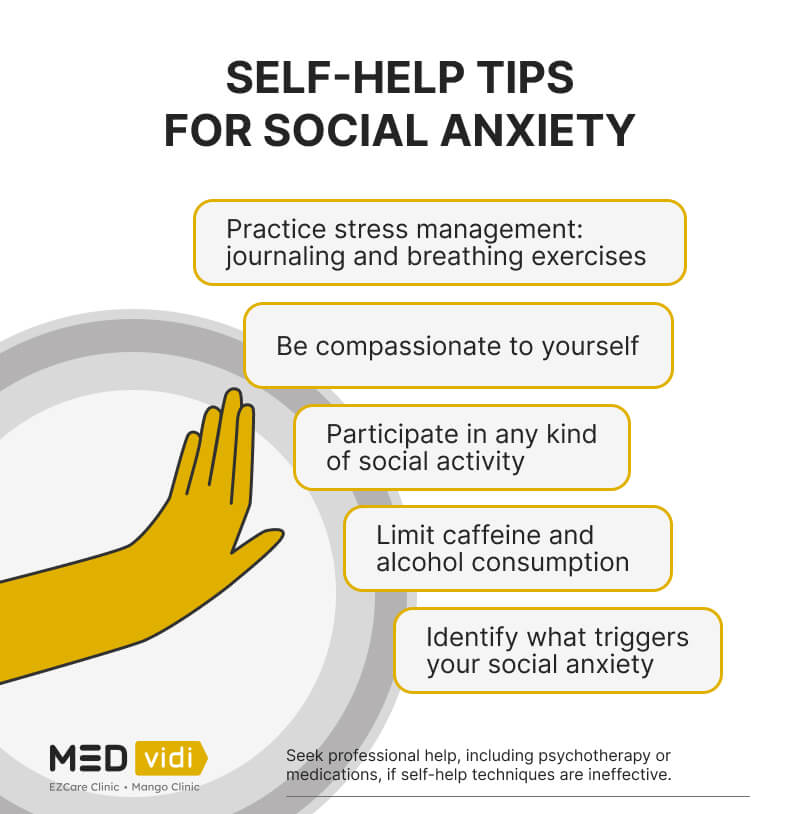It is common to stress about an upcoming speech or a job interview. However, when the fear of social activities and interactions becomes so high that it starts interfering with your daily functioning, it could mean having a mental health condition called social anxiety disorder.
Social anxiety or social phobia is one of the most common anxiety disorders, affecting over
Receive a personalized treatment plan for social anxiety online.
What Is Social Anxiety Disorder?
Social anxiety disorder or social phobia is characterized by exaggerated fears of social interactions in one or several settings. These often include meeting new people, job interviews, dating, eating in public, and others. A person may be nervous because of the possibility of being judged or humiliated even when there are no specific reasons to expect that. Scrutiny by others can make a person apprehensive about being involved in any kind of social participation.
Common behavioral symptoms of social phobia include:
- Refraining from social activities
- Talking less during conversations
- Avoiding eye contact
- Portraying excessive self-consciousness
- Having low self-esteem
- Having difficulty maintaining relationships
Social anxiety can also be a source of physical symptoms, including:
- Excessive sweating
- Blushing
- Shaking
- Dizziness
- Palpitations or irregular heartbeat
- Breathing difficulties
- Muscle tension
- Stomach problems
If the symptoms become severe, they may transform into a panic attack. If these signs interfere with daily life, it’s important to seek professional support.
Ways to Deal With Social Anxiety
There are different effective medical solutions to relieve social anxiety. Treatment plans for this condition usually involve several options, such as psychotherapy, medication management, and self-help techniques. Methods for coping with social anxiety are explained below.
Mental Health Therapy
Psychotherapy/ talk therapy often helps reduce the effects of social anxiety in the long run. Some of the most common therapies for this disorder include:
- Cognitive behavioral therapy (CBT): Developed in the 1960s,
CBT is a well-researched[2] treatment option that has been used to combat and can impartlong-lasting therapeutic effects[3] . During therapy sessions, clients have an open discussion about ongoing problems, including worrying thoughts, feelings, and experiences. Therapists also provide their patients with coping skills to deal with emotional challenges. - Interpersonal psychotherapy (IPT): This therapy is based on the principle that patients with social phobia have less developed interpersonal skills which makes social interactions a challenge rather than a reward. It focuses on interpersonal relationships and their impact on mental health. IPT aims to work on social skills and is
successful in lowering social anxiety symptoms[4] in patients. - Exposure Therapy: This approach aids individuals in desensitizing and managing social anxiety. It enhances their tolerance for discomfort and uncertainty in social contexts, ultimately reducing anxiety. This process fosters self-confidence and complements CBT by challenging negative thoughts. In modern practice,
virtual reality exposure therapy[5] uses interactive technology, creating safe, controlled virtual environments for individuals to help them in overcoming social anxiety. - Group Therapy:
Group therapy[6] can encompass various psychotherapies, including CBT. People with social anxiety find support by sharing their experiences. This sharing creates a sense of belonging, lessens isolation, and allows them to learn new coping and communication skills through interactions with others in similar situations. - Support groups: Support groups offer a warm and accepting environment where individuals with social anxiety can express their feelings openly and provide ongoing emotional support. These groups help to reduce the stigma surrounding mental health issues and also become a medium for sharing coping mechanisms to break the “social anxiety curve.”
Today, psychotherapy can be conducted using modern communication technologies. The patient connects with their therapist via video calls and can receive personalized support without the need to visit a healthcare facility in person. The research data on the effectiveness of virtual therapy is still evolving but a few
Medications
Various pharmacological options are available to alleviate social anxiety. The most commonly recommended medications are:
- Selective serotonin reuptake inhibitors (SSRIs): SSRIs are the
preferred medications for social anxiety[8] . These antidepressants work by affecting the transportation of a specific neurotransmitter (serotonin) and increasing its levels in the brain. It may take them 4 to 12 weeks to achieve significant clinical improvement. Examples of SSRIs frequently prescribed to manage social phobia include sertraline (Zoloft) and paroxetine (Paxil). - Serotonin and norepinephrine reuptake inhibitors (SNRIs): Also belonging to the antidepressant category, SNRIs are
effective in managing social anxiety[9] . They increase the levels of two neurotransmitters, serotonin and norepinephrine, in the brain. It takes them weeks to months to impart their full therapeutic effects to patients battling social anxiety. The most common SNRI recommended for social phobia is venlafaxine (Effexor). - Benzodiazepines: In comparison to antidepressant medications, benzodiazepines belong to the sedative-hypnotics class of drugs that act fast to reduce social anxiety symptoms. They work by increasing the activity of an inhibitory neurotransmitter, GABA, in the brain. However, due to the potential for abuse and other severe side effects, benzodiazepines are only used short-term to manage anxiety. Examples of these medications include alprazolam (Xanax), diazepam (Valium), lorazepam (Ativan), and clonazepam (Klonopin).
- Monoamine oxidase inhibitors (MAOIs): Although not often used these days to ease social anxiety due to their side effects and dietary restrictions, MAOIs were the
first antidepressant class[10] that showed potential to manage social phobia. Monoamine oxidase is an enzyme that degrades the levels of serotonin, dopamine, and norepinephrine in the brain. By blocking the activity of the enzyme, MAOIs increase the levels of these neurotransmitters. Common MAOIs are isocarboxazid (Marplan) and phenelzine (Nardil). - Beta-blockers: While beta-blockers are not approved by the FDA for treating anxiety disorders, they are sometimes recommended off-label to manage physical symptoms of anxiety. They primarily decrease blood pressure to lower anxiety levels. Propranolol (Inderal) and atenolol (Tenormin) are most often used to tackle physical discomfort experienced in anxiety.
Consult a healthcare professional at MEDvidi to know what treatment can help you best.

Alternative Treatment Options
Treatment for social anxiety disorder usually follows a comprehensive approach. In addition to medical interventions, a healthcare provider may recommend various strategies that can also help to combat social anxiety:
- Meditation: Meditation techniques like mindfulness promote relaxation and reduce stress. It makes individuals with social anxiety more aware of their triggers and responses by focusing on the present moment. Meditation also aids in emotional regulation which can be very beneficial for social anxiety.
- Physical exercise: Physical activity, especially
aerobic exercise[11] , can be beneficial in reducing stress and releasing endorphins, improving mood. Regular exercise can also enhance self-esteem and body image, which may help individuals become more comfortable with social interactions, gradually reducing social anxiety. - Yoga: Yoga is an ancient technique that combines movement, meditation, and breathing exercises to lower stress and anxiety. It encourages self-awareness leading to a better understanding of disturbing thought patterns and can help individuals minimize social anxiety
- Acupuncture: During acupuncture, skin is penetrated with needles at specific points that are believed to stimulate the central nervous system. This activity may induce relaxation, regulate stress hormones, and enhance sleep quality which results in lower stress levels.
- Breathing exercises: Slow deep breathing can activate the body’s parasympathetic nervous system, reducing the “fight or flight” response associated with anxiety. This helps lower heart rate, blood pressure, and muscle tension associated with anxiety.
- Progressive muscle relaxation: This relaxation technique involves tensing and relaxing different groups of muscles at a time. It can provide a sense of control over physical symptoms of anxiety and promote relaxation, making it easier to face anxiety-provoking social situations with greater calm.
Self-help Tips for Dealing with Social Anxiety
In addition to practicing relaxation techniques, there are many lifestyle adjustments that can help to get rid of social anxiety and stress. Let’s review a few common ones:
- Identify your anxiety triggers: Understanding social anxiety triggers can be a beneficial step in controlling anxious feelings related to social interactions. By recognizing what specifically triggers your symptoms, you can work on strategies to defeat social anxiety effectively.
- Engage in socialization: Although it can be tough to deal with social anxiety to participate in any kind of social activity, it is important to take measures to address this issue head-on. Engaging with family and friends can be one of the most effective ways to help with social anxiety.
- Limit caffeine intake: High levels of
caffeine consumption[12] have been linked with increased stress and anxiety levels. Limiting caffeine up to the recommended amount of 400 milligrams can reduce anxious feelings. That is roughly four cups of coffee during the day. - Decrease alcohol consumption: Alcohol affects brain chemistry, and heavy drinking can increase anxiety symptoms. Decreasing or avoiding alcohol may help reduce anxiety and contribute to a higher efficacy of treatment.
- Practice kindness: Being compassionate and kind towards oneself and others can initiate social feedback, consolidating the idea that social interactions are not as daunting as one may think. It makes engaging in social conversations easier and more rewarding aiding the symptoms of social anxiety.
Note that self-help techniques might not be enough to overcome social anxiety disorder. It’s important to consult a healthcare provider to know what treatments and self-help methods can help you best and monitor your progress during follow-up sessions.
How to Choose the Treatment Option That’s Right for You?
The best treatment option can only be chosen with the guidance of an experienced healthcare professional after a proper diagnosis and discussion. The intensity of social anxiety can vary with time, and continuous monitoring from medical professionals is recommended until anxiety is contained at a manageable level.
For mild social anxiety, lifestyle adjustments and coping mechanisms may be sufficient to bring the symptoms under control. However, moderate to severe social anxiety requires medical interventions in the form of therapy, medications, or a combination of both. Addressing and treating social anxiety can be a time-consuming journey requiring different treatments at various stages and it’s much better to go through it under professional medical guidance.
See a healthcare professional online and get personalized recommendations.
In Conclusion: When to See a Mental Health Professional?
Social anxiety disorder is a chronic mental health condition affecting social communication skills and can severely affect the quality of life. It is recommended to see a mental health professional as soon as you experience any warning signs that interfere with your daily functioning.
To relieve social anxiety, it is important to take swift action can be key to avoiding the progression of the disease into a severe one. At MEDvidi, our licensed healthcare professionals are experienced and trained in managing anxiety with comprehensive online care plans personalized to your needs.
FAQ
What are the most common symptoms of social anxiety?
The symptoms of social anxiety can vary in nature and intensity among individuals. The most common ones are:
- Difficulty making eye contact.
- Having a rigid body posture.
- Speaking with a low or soft voice.
- Having problems interacting with strangers.
- Blushing.
- Excessive sweating.
- Feeling self-conscious in social settings.
- Fearing criticism from other people.
- Avoiding social interactions altogether.
What is the root cause of social anxiety?
There is no single specific root cause of social anxiety, rather many different factors may come into play for its origin. Genetics, changes in brain chemistry, environmental stressors, and childhood traumatic experiences have all been associated with the development and progression of social phobia. Hence, to increase the chances of fighting social anxiety, it may be helpful to see a mental health professional, explore potential root causes, and choose an appropriate plan to manage the disorder.
Is it social anxiety or shyness?
Although social anxiety and shyness are often used interchangeably, they are not the same in terms of their intensity and impact on life. Shyness is an introverted personality trait that may cause occasional discomfort during social interactions. In contrast, social anxiety is a diagnosable mental health disorder that significantly disrupts a person’s life and well-being. Moreover, shyness can be overcome with certain coping strategies, but it can be challenging to calm social anxiety without medical help.
How do you socialize with social anxiety?
It can be challenging to work on social anxiety symptoms and get relief; however, it is possible by implementing various medical and coping strategies. The most common treatment of social anxiety disorder includes cognitive-behavioral therapy and medications such as antidepressants and benzodiazepines. Non-medical treatment options include coping strategies such as meditation, yoga, relaxation exercises, and lifestyle adjustments. By implementing these strategies, it is possible to socialize with other people normally.
Can social anxiety be cured naturally?
There is no ultimate cure to social anxiety but it can be managed through different treatment modalities. Although natural treatment strategies can be beneficial for relieving social anxiety, they may not be as effective as medical interventions. The most common natural coping mechanisms to combat social anxiety symptoms include meditation, yoga, acupuncture, breathing exercises, and others. These strategies bring the best results when coupled with medical treatment.












